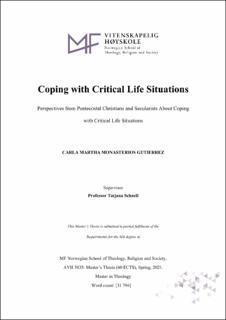Coping with Critical Life Situations : perspectives from Pentecostal Christians and Secularists About Coping with Critical Life Situations
Master thesis
Permanent lenke
https://hdl.handle.net/11250/2825345Utgivelsesdato
2021Metadata
Vis full innførselSamlinger
Sammendrag
Few studies have been done on religious coping among the Pentecostal Christian movement in Norway. The aim of this study is to explore how a small sample of Norwegian Pentecostals and Secularists cope with critical life situations. This qualitative study includes data collected through semi-structured interviews with six Pentecostals Christians and six Secularists (defined as a person who has no religion or religious beliefs) coping with their problems.The most central theory used in this thesis is Kenneth Pargament’s coping theory based on the role of religion in sustaining meaning and hope in the face of adversity. The findings from the study show that the central difference between the two groups is who they turn to in the face of adversity. Pentecostal Christians exhibited positive religious coping by turning to God in times of difficulty. Religious coping was characterized by: Faith in God in whom they found security and strength. and through which they attributed significance and sources of meaning during adversity. The Secularists turned to family and friends, to enhance their capacity for self-regulation and stress management. Both groups differed in their ways of facing their problems, but at the same time they also had other similar ways of facing adversity which included turning to their loved ones such as family and friends and introspection (personal reflection) when faced with adversity and critical life situations.
